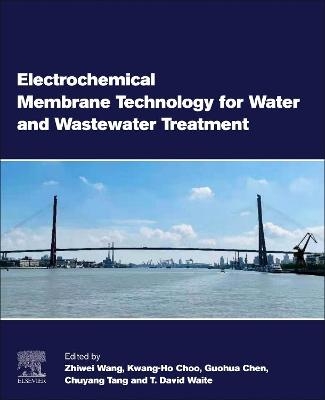
Electrochemical Membrane Technology for Water and Wastewater Treatment
Elsevier Science Publishing Co Inc (Verlag)
978-0-12-824470-8 (ISBN)
Electrochemical Membrane Technology for Water and Wastewater Treatment also introduces fundamental theories and applications of electrochemical membrane technology. The knowledge gaps and future research perspectives in electrochemical membrane technology are also addressed. This book is an excellent resource for the understanding of fundamental theories, latest developments and future prospects in electrochemical membrane technology, which can benefit a broad audience of researchers and engineers working in water purification, membrane technology and electrochemical process.
Zhiwei Wang is dean of the School of Environmental Science and Engineering at Tongji University, China. His research interests are in the field of wastewater treatment and reclamation using physical-chemical and biological technologies. He is particularly interested in the membrane-based processes for wastewater treatment and energy/resource recovery. Professor Wang served as chair of the International Water Association (IWA) China Young Water Professionals, currently an IWA Fellow, a member of Management Committee of IWA Specialist Group on Membrane Technology, Executive Management Committee of Chinese Society for Environmental Sciences, and vice director of Young Scientists Committee of Chinese Society for Environmental Sciences. He also serves on the editorial boards of several journals including the Journal of Environmental Chemical Engineering, Environmental Research, Fundamental Research (NSFC), and Scientific Reports and Environmental Engineering (Chinese Journal). He has authored/co-authored over 200 peer-reviewed papers in SCI-indexed journals. Dr. Choo is a professor in the Department of Environmental Engineering and the Director of the Advanced Institute of Water Industry at Kyungpook National University, Korea. He received his Ph.D. degree from Seoul National University, Korea in 1996 and since then has been working on membrane technology for water and wastewater treatment, pursuing breakthrough innovations for novel membranes and membrane processes. His recent research interests include electrochemical membrane filtration, quorum quenching membrane bioreactors, and iron oxide coated media filtration. He is keen to find synergistic strategies for the best practices of separation, treatment, abatement, and recovery on the management of water and wastewater streams. He has been involved in academic societies, such as Korean Society of Environmental Engineers, Membrane Society of Korea, International Water Association, American Chemical Society, and World Filtration Congress as an active member. He served as the Director of the Center for Blue Gold Cluster (Water Reuse R&D Center) funded by the Korean government and currently serves as a management committee member of the IWA Specialist Groups. Chuyang Y. Tang is a Professor of Environmental Engineering in the University of Hong Kong. After receiving his PhD degree from Stanford University in 2007, he worked at Nanyang Technological University, University of Hong Kong and University of New South Wales. His research focuses on membrane separation, water reuse and desalination, fouling mechanisms, membrane characterization, and novel membranes and processes. Professor Tang has published more than 200 journal papers, with a total citation of > 12,000 and H-index of 62 (Web of Science). He is an inventor of more than 10 patents, with several technologies being licensed. His patent on aquaporin biomimetic membranes has been commercialized by Aquaporin A/S and Aquaporin Asia. Professor Tang is a recipient of the Finland Distinguished Professor Program Fellowship, the International Desalination Association Fellowship, and the Singapore Ministry of National Development R&D Merit Award. T. David Waite is a Scientia Professor in the School of Civil and Environmental Engineering at the University of New South Wales in Sydney, Australia, and a foreign member of the US National Academy of Engineering. He served as Director of the UNSW Centre for Water and Waste Technology (now UNSW Water Research Centre) from 1993 to 2006 and was Research Director for the School from 1997 to 2006 before taking over as Head of the School of Civil and Environmental Engineering in 2007. He continued as Head of till early 2013 before taking on the role of Deputy Dean (Research) in the Faculty of Engineering. Professor Waite obtained his undergraduate degree from the University of Tasmania (1974), Master degree from Monash University (1977) and PhD from the Massachusetts Institute of Technology (1984). Before joining UNSW as Head of the Department of Water Engineering in 1993, he spent eight years undertaking research at the Australian Nuclear Science and Technology Organisation (ANSTO) and, prior to this, two years as a Postdoctoral Fellow at the University of Melbourne and five years at the State Rivers and Water Supply Commission in Melbourne. His speciality areas of teaching are water chemistry and water treatment and his principle research area is that of investigation of physico-chemical processes in natural and engineered systems. Professor Waite has recently commenced as Executive Director of the UNSW Centre for Transformational Environmental Technologies (CTET) in Yixing (Jiangsu Province) and is an Associate Editor of the journal Environmental Science & Technology.
1. Introduction to electrochemical membrane technology: Current status and recent developments 2. Fundamentals of electrochemical membrane technology 3. Electrochemical membrane materials and modules 4. Electrified Carbon Nanotube Membrane Technology for Water Treatment 5. Electrochemical membrane technology for disinfection 6. Electrochemical membrane bioreactors for wastewater treatment 7. Electrochemical membrane technology for fouling control 8. Electrochemical membrane technology for environmental remediation 9. Electrodialysis membrane technology for industrial wastewater treatment:Recent advances 10. Membrane-based electrochemical technologies: I. Membrane capacitive deionization (MCDI) and Flow-electrode capacitive deionization (FCDI) 11. Membrane-based electrochemical technologies: II. Microbial desalination cell 12. Membrane-based electrochemical technologies: III. Selective ion removal/recovery 13. Membrane-based electrochemical technologies for simultaneous water treatment and salinity-gradient energy production
| Erscheinungsdatum | 19.04.2022 |
|---|---|
| Sprache | englisch |
| Maße | 191 x 235 mm |
| Gewicht | 970 g |
| Themenwelt | Naturwissenschaften ► Biologie ► Mikrobiologie / Immunologie |
| Naturwissenschaften ► Chemie ► Technische Chemie | |
| Technik ► Umwelttechnik / Biotechnologie | |
| ISBN-10 | 0-12-824470-4 / 0128244704 |
| ISBN-13 | 978-0-12-824470-8 / 9780128244708 |
| Zustand | Neuware |
| Informationen gemäß Produktsicherheitsverordnung (GPSR) | |
| Haben Sie eine Frage zum Produkt? |
aus dem Bereich


